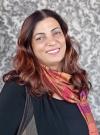
Nominated as a leading women’s and human rights activist who, after personally suffering horrific violence, has initiated Turkey’s most widespread, dynamic and successful grassroots women’s network in the war-torn southeast, promoting peace and nonviolence.
Born in 1955, Nebahat Akkoç grew up in a family of eight siblings, but with almost no relatives from either her mother’s or her father’s side. The family identified itself as Kurdish and lived in different towns in the southeast, but had no “hometown” to associate with. It took Nebahat Akkoç almost 40 years to discover the reasons behind this vacuum. Her mother had been born into a Zaza Alevi family in Dersim, but had been adopted by a Sunni family from Elazığ after losing her father and other members of her family in 1938. On other words, she was one of the “lost girls of Dersim” (Dersim’in kayıp kızları). Nebahat’s father had also been born into a family of “orphans” -- two Armenian orphans (one from Van, the other from Erzurum) had married each other after losing their entire families in 1915. It is only over the last five years that Nebahat Akkoç has been able to bring the different pieces of her family puzzle together to make sense of its deep silences, as a result of which she now identifies herself as çokkimlikli (having multiple identities)
-- Kurdish, Zaza, Alevi, and Armenian. In terms of her life activity, she is a feminist who has dedicated herself to a politics of nonviolence, which recognizes no borders, whether ethnic, religious, gender-based, or other.
In the early 1990s, when the armed conflict in Turkey’s southeast escalated, the Akkoç family was living in Diyarbakır, Nebahat working as a primary school teacher, and her husband Zübeyir running a bookshop. They paid the highest price for their human rights activism. First their bookshop was bombed; then in January 1993, Zubeyir Akkoç was killed by “unidentified” assailants (faili meçhul); a year later, in February 1994, Nebahat Akkoç herself was taken into custody, where she was severely tortured, losing 10 kilos in ten days. All in all, she was taken into custody 15 times until 1997, while her family received many threats. Resisting the calls from others to leave Diyarbakır, Nebahat Akkoç continued her struggle as a human rights activist, working as a member of the Executive Committee of the Human Rights Association (İnsan Hakları Derneği) over 1994-1997. She led the first campaign, working with the late Kevin Boyle and others, to educate victims of human rights violations about the right to appeal to the European Court of Human Rights, and submitted one of the first applications for her own torture and the murder of her husband, ultimately winning both cases (in 2000).
In 1997, in the midst of heavy violence, Akkoç and her small circle of co-activists established the Diyarbakır Women’s Center (KAMER). Although most women in the center and the region were Kurdish, they did not attach an ethnic label to their organization, opting for “an independent women’s center for all women.” Thereby embracing Arab, Assyriac (Christian), Azeri, Kırmanci, Roma, Zaza and Turkish as well as Kurdish women over the years, KAMER has moved from being a small women’s center with a hotline for victims of domestic violence, to a foundation that coordinates a network of women’s centers in 23 eastern and southeastern cities, addressing domestic violence, violence in the name of honour, and all sorts of discrimination. KAMER has also run kindergartens and developed programs for non-sexist education, as well as designing programs for supporting women’s entrepreneurship. Since 1997, KAMER has reached more than 200.000 women in Eastern and Southeastern Turkey, and, in the past two years, KAMER women have been invited to conduct “awareness groups” and share their experience in feminist organizing in 18 cities thoughout Turkey (including Bandırma, Çanakkale, Edirne, Hatay, İstanbul, İzmir, Manisa, Tekirdağ, and Trabzon). In a very recent meeting in Istanbul, under the title Haklı Şiddet Yoktur (There is No Just Violence), they brought together more than 150 KAMER activists from 41 cities across the country.
From India to the Netherlands, Nebahat Akkoç has also been involved in international networks of solidarity and action. When asked to define herself, Nebahat says that she feels like a world citizen. When she was named as one of the “Heroes of Our Time” by Time magazine in 2003, she was introduced as a person who has crafted a new life at a moment of multiple challenges, when many others would have given up on life altogether. She has also received the Amnesty International Ginetta Sagan Award (2004), Mevlana Evrensel Kardeşlikten Dünya Barışına Çağrı Ödülü (2004 Mevlana Award for the Call to World Peace through Universal Brother/Sisterhood), the French Legion d'Honneur Medal (2006), the SODEV Human Rights Award (2006), the Schwap Foundation Social Entrepreneur of the Year Award (2008), and the Danish MDG3 Global Call to Action Torch (2008).
Nebahat Akkoç is the author of many books published by KAMER, and her life story has recently been published in a book prepared by Ceren Belge (Ohalde Feminizm, Nebahat Akkoç Anlatıyor, Ayizi Yayınları, 2012).

